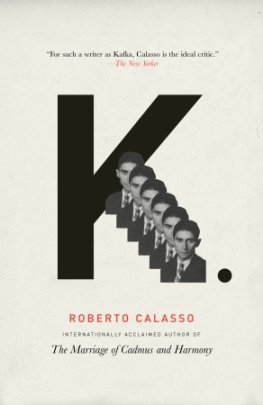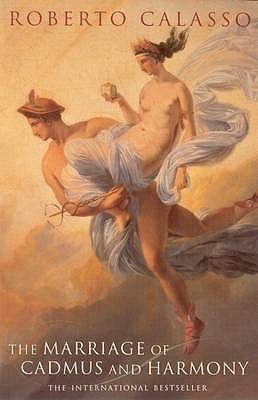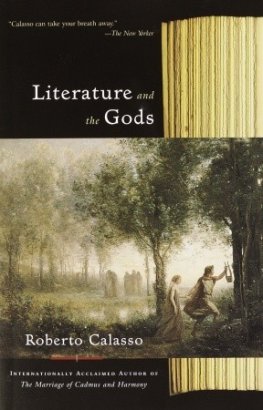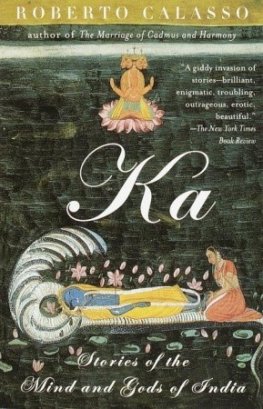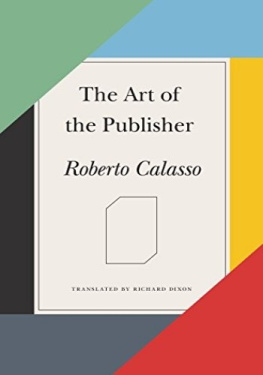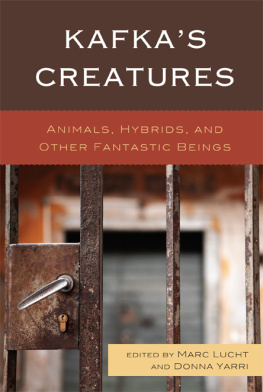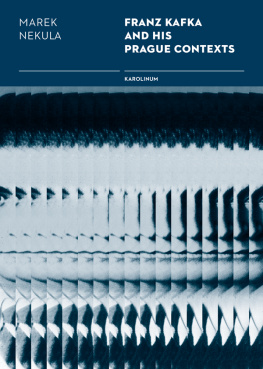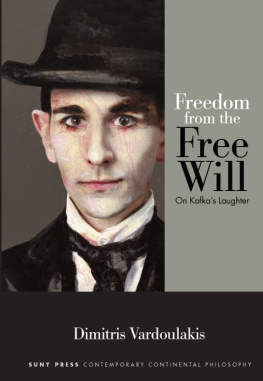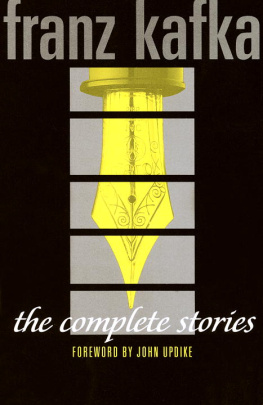Thomas Bernhard
Correction
Roberto Calasso is the author of The Ruin of Kasch, The Marriage of Cadmus and Harmony and Ka; K. is the fourth book in the series. He has also written The Forty-Nine Steps and Literature and the Gods. He lives in Milan and is the publisher of Adelphi.
I. The Saturnine Sovereign
At the beginning theres a wooden bridge covered with snow. Thick snow. K. lifts his eyes toward what seemed to be emptiness, in die schein bare Leere. Literally: toward the seeming emptiness. He knows theres something out in that emptiness: the Castle. Hes never seen it before. He might never set foot in it.
Kafka sensed that by then only the minimum number of elements of the surrounding world ought to be named. He plunged the sharpest Ockhams razor into the substance of the novel. To name the bare minimum, and in its pure literality. And why so? Because the world was turning back into a primeval forest, too fraught with strange noises and apparitions. Everything had too much power. Thus it became necessary to limit oneself to what lay closest at hand, to circumscribe the zone of the nameable. Then all that power, otherwise diffuse, would be channeled there, and whatever was named an inn, a file, an office, a room would fill with unprecedented energy.
Kafka speaks of a world that precedes every division, every naming. Its not a sacred or divine world, nor a world abandoned by the sacred or the divine. Its a world that has yet to recognize such categories, to distinguish them from everything else. Or that no longer knows how to recognize them or distinguish them from everything else. All is a single unity, and it is simply power. Both the greatest good and the greatest evil are saturated with it. Kafkas subject is that mass of power, not yet differentiated, broken down into its elements. It is the shapeless body of Vritra, which contains the waters, before Indra runs it through with a thunderbolt.
The invisible has a mocking tendency to present itself as the visible, as if it might be distinguished from everything else, but only under certain circumstances, such as the clearing away of mist. Thus one is persuaded to treat it as the visible and is immediately punished. But the illusion remains.
The Trial and The Castle are stories about attempts to deal with a case: to extricate oneself from prosecution, to have ones nomination confirmed. The point around which everything revolves is always election, the mystery of election, its impenetrable obscurity. In The Castle, K. desires election and this thoroughly complicates every act. In The Trial, Josef K. wants to escape election and this thoroughly complicates every act. To be chosen, to be condemned: two possible outcomes of the same process. Kafkas relationship to Judaism, every recess of which has been doggedly (often fruitlessly) examined, emerges most clearly on this point, which marks the essential difference between Judaism and what surrounded it. Much more so than monotheism or law or higher morality. For each of these, one can look to Egypt, Mesopotamia, or Greece for precedents and counterbalances. But the emphasis on election thats unique, and founded on a theology of the unique.
The court has the power to punish, the Castle, to elect. These two powers are perilously close, at times identical. More than anyone else, Kafka, thanks to atavism and inclination, had antennae to recognize them. No one else was so aware of their proximity, their overlap. But this wasnt only a matter of Jewish heritage. It had to do with everyone, and all times.
The Trial and The Castle share a premise: that election and condemnation are almost indistinguishable. That almost is why we have two novels rather than one. The elect and the condemned are the chosen, those who are singled out among the many, among everyone. Their isolation lies at the root of the anguish that engulfs them, whatever their fate.
The main difference is this: condemnation is always certain, election always uncertain. Unknown persons show up in Josef K.s bedroom, devour his breakfast, and inform him that hes being prosecuted on criminal charges. The prosecution is itself already the sentence. And nothing could be as undeniable as that intrusion in front of witnesses. For K., on the other hand, doubt remains: had he really been named land surveyor? Was K. called, or did he only wish to be called? Is he the legitimate holder of an office, however modest or a braggart who claims a title that isnt his? On this point K., who is nimble and tenacious in his analyses, proves evasive. His history, prior to the long, difficult voyage that brought him to the Castle, remains murky. Had he received a summons or did he set out on his voyage in order to obtain one? Theres no way to know for certain. But there are many ways to aggravate and exacerbate the uncertainty.
The village superintendent tells K.: Youve been taken on as a land surveyor, as you say, but unfortunately we have no need for a surveyor. The cruelty is not in the final phrase but in the piercing as you say. Nor do Castle authorities ever admit anything else, leaving open until the end the possibility that K.s belief is delusory or simply feigned.
One fact only is certain, according to the superintendent, who likes to make clear that he is not enough of an officialand therefore not of sufficient stature to handle such questions since he is a peasant and nothing more. And the fact is this: one day long ago a decree was issued ordering the appointment of a land surveyor. But that remote decree, which the superintendent would no doubt have forgotten had his illness not offered him the chance to think back on the silliest matters, couldnt have had anything at all to do with K. Like all decrees, it hovered above everyone and everything, without specifying when and to whom it would be applied. And it has languished ever since among the papers crammed in the cabinet in the superintendents bedroom. Though buried in that intimate, unsuitable place, it has maintained its irradiant energy.
But uncertaintys torment never ends. On one hand the superintendent continues to converse with K., implying that K. has good reasons for questioning him. On the other, he never goes so far as to recognize the legitimacy of K.s claim and weve known at least since Hegel that the human animal requires only recognition. The superintendent continues: Even your summoning was carefully considered; it was just a few incidental details that caused confusion. K.s summoning, then, was in fact the object of reflection on the part of the authorities but what of their conclusion? Was K. ever called? Its a question the superintendent is careful not to answer.
A further stage of torment emerges when the superintendent while reconstructing the complex history of the decree to appoint a land surveyor and of the villages misdirected reply, issued by the superintendent himself, to that decree (a misdirected reply evidenced, according to the reconstruction, by an empty envelope, now misplaced) lets it be understood that sometimes, especially when a matter has been considered at great length, it may resolve itself with lightning speed, as if the official apparatus could no longer tolerate the tension, the prolonged irritation of the unresolved question, and so proceeded to eliminate it by reaching a decision without the help of the officials. Such a possibility, therefore, does exist, as the superintendent himself admits. But could this be what has happened in K.s case? Here again the superintendent retreats, offering no guarantees: I dont know whether such a decision was reached in your case some elements speak for it, others against.

